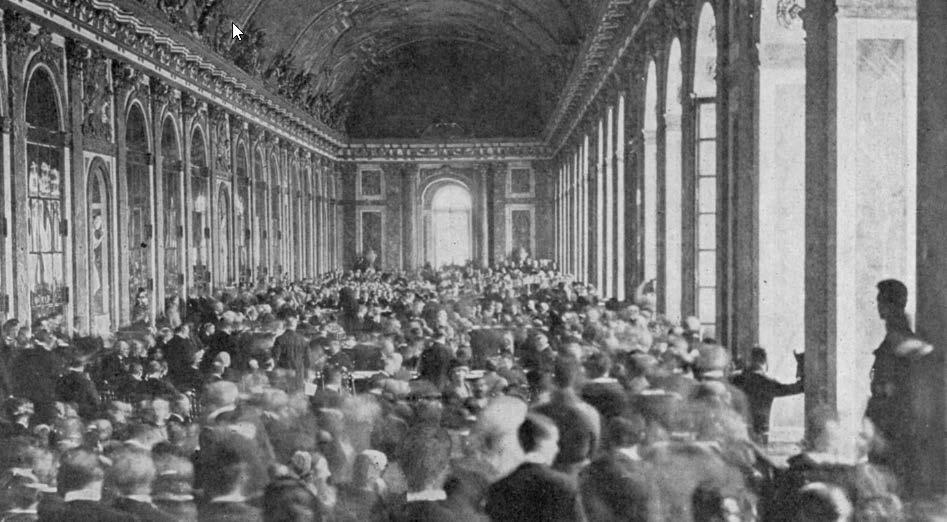
4 minute read
Aftermath and final thoughts
As the centenary commemorations of the First World War draw to an end, we inevitably begin to consider its impact and longer-term legacy. Historians have pondered over that impact, the historian David Reynolds describing it as ‘The Long Shadow’ while the title of Robert Gerwarth’s recent book is Why the First World War failed to end. If the Armistice of 11 November 1918 brought an end to conflict in those parts of the world where the Allied and Associated Powers had engaged with Germany and her allies, wars continued to rage across much of the world, notably in Eastern Europe, the Middle East and Russia, and millions continued to die from conflict, dislocation, genocide and sheer starvation. Twenty years later, another world war broke out which begs the question why was the First World War not ‘the war to end all wars’ which had been the passionate hope of so many people, especially the bereaved and the suffering? In part, the answer lies in the impact of the war on the old structures of Europe which, for better or worse and with few exceptions, had ensured general stability over the previous century. Four major Empires, Hohenzollern, Habsburg, Romanov and Ottoman, all collapsed and led to ferocious struggles as minority nations and groups within these territories sought self-determination, encouraged by world leaders such as US President Woodrow Wilson. In the process and in the absence of overarching authority, old scores were settled, Christian against Muslim, Turk against Greek, gentile against Jew. Elsewhere, radical movements took their cue from the Bolshevik Revolution in Russia in 1917 and sought to overturn established authority and systems which, in turn, prompted anti-communist violence.
Left: Salle de la Reformation, the official opening of the League of Nations in Geneve. Public domain. Source: https://commons.wikimedia.org/wiki/File:No-nb_bldsa_5c006.jpg New states emerged and others were revitalised but while the new structures were often ostensibly democratic, they were composed of competing ethnic interests and their inherent fragility was exposed when authoritarian challenges arose in the 1930s both through the revival of Germany and the emergence of a new Russian empire, the Soviet Union. The deliberations at Versailles throughout the first half of 1919 did not, in the end, create the basis for an enduring peace because the terms of the treaty signed on June 28 satisfied no one in the longer term, least of all Germany, which felt humiliated both by their exclusion from the deliberations and the developing myth that they had never been defeated but betrayed from within. Resentment undermined the new democracy in Germany and laid the foundations for the rise of the Nazis. Meanwhile, the failure of the US Senate to ratify the Versailles Treaty, despite the prominent role of their own President, or to join the new League of Nations meant that the new ‘world order’ was doomed to failure. Within Britain, and not least in Wales, the war also caused significant economic dislocation which had consequences long after the war ended. There had been a boom in wages and living standards during the war, but this ended soon after and the story of the 1920s was one of economic decline, wage reductions and serious industrial unrest. At the same time, the decision in Britain to fund the war through borrowing rather than taxation had major consequences on the balance of economic power which shifted to the wartime banker of Europe, the United States. However, the fever of speculation within the US evaporated in the dramatic Wall Street crash in 1929 and this had reverberations across the world, notably in Europe, leading to the Great Depression.
Above: Versailles 1919 © Unknown but photo is known to be out of copyright
Yet, there were some beneficial outcomes from the war, notably in the acceleration of technological developments in transport and communications and major advances in medical practice. And the sense of relief at the end of the war, despite the continuing bereavement of so many families, was translated into a vibrant age of music, fashion and culture. Although the promise of ‘homes for heroes’ was not fully delivered, significant improvements were made in housing policy and management which inaugurated an era of mass council house construction. And in politics, too, there was transformation partly as the result of the huge increase in the electorate and the inclusion of many women within it; soon the former Liberal ascendancy was displaced by Labour, especially in Wales. Yet change, in many respects, remained slow and it would take another dreadful global war, with even more casualties, to accelerate the process of social and economic regeneration and embark on a path to relative stability and prosperity. In the wake of seven years of centenary commemorations, therefore, it is as vital as ever that we never forget the significance and impact of the First World War and to elicit what lessons can be learnt from it.
Sir Deian Hopkin

Above: Cymru’n Cofio Wales Remembers 1914-1918 final event held at the Senedd in March 2020 © Crown copyright. Left to right: Sir Deian Hopkin, Linda Tomos, Jonathan Dawes, Rhian Shillabeer, Mark Drakeford MS, Elin Jones, Llywydd.
On 9 March 2020, the First Minister of Wales Mark Drakeford MS hosted a reception at Y Senedd to mark the completion of the Cymru’n Cofio Wales Remembers Programme. Welsh Ministers and Assembly Members attended the event, along with invited guests who were involved in the Programme. The First Minister, the Llywydd, the previous First Minister, Carwyn Jones MS and the Welsh Government’s Expert Adviser on the Centenary of the First World War, Prof Sir Deian Hopkin, gave speeches reflecting on the commemoration and giving thanks to those who had contributed. Two members of the Welsh Youth Parliament, Jonathan Dawes and Rhian Shillabeer were chosen to participate and they spoke about how the commemoration has helped young people to better understand peace, reconciliation and remembrance.










